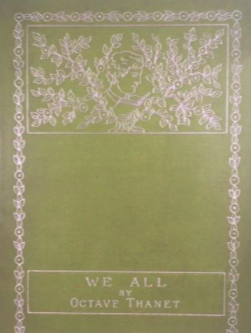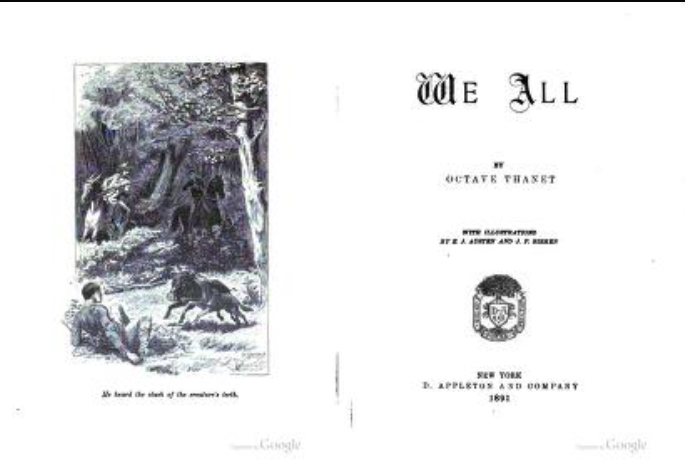Basic Summary: Cecil Raimund goes to Arkansas to the Seyton Plantation to spend time with his twin cousins Alan (Ally) and Sally. In the two weeks covered by the novel, Cecil helps the twins solve the mystery of the KKK scaring people. It turns out that Dawsey has been counterfeiting for the last five years, and while they suspect he's the one parading as the KKK, it turns out that Aunt Valley, a local conjure woman, and Larry, Dawsey's nephew, pretended to be KKK hoping it would lead to Dawsey being arrested for moonshining or lynched by the black people in the area. The book is very much a "juvenile novel" as McMichaels indicates, as the kids are the ones who solve the mysteries. Larry confesses to the trickery after Dawsey is dead because Dawsey accused Cobbs of conspiring with him to ride as the KKK as he's dying. There is some discussion in the novel of whether Cobbs is racist, which adds some credibility to Dawsey's "confession." Ultimately, the truth is revealed and things are tidy and neat for the most part--the kids are rewarded. Larry gets to live with Cobbs, Ally and Cecil become the best of friends (in a mirroring relationship of the one between Raimund and Seyton), and Sally gets $500 for her shrewd detective work. The Title: The title is echoed in two passages in the book. First, by Colonel Seyton after things have calmed down and Cobbs is no longer under suspicion. Basically, Seyton praises everyone involved in the resolution of the story, not just his own children (although Sally is the best detective of them all). "'This is just in time for a toast,' said he. 'Cobbs, here's your glass, man. 'WE ALL, East AND WEST, NORTH AND South! To our better acquaintance, because that means to our better and closer and dearer friendship.'" (Thanet, p. 271). Cecil, being from Chicago, thinks of himself as a northerner and spends the early parts of the novel thinking that his Arkansas cousins are simple and poor. He assumes he can better them at just about everything, including hunting. During a hog hunt he and Ally are not supposed to be on, Cecil faces a wild boar and thinks he can kill it with his revolver. Cobbs and Ally shoot the boar before it can get to Cecil, and he's humbled by it. Ally assures him that had they not intervened, Cecil surely would have felled the hog himself. The final paragraph of the book echoes the title and is reminiscent of the hog hunt, as well as the solving of the mystery and Cecil growing up. "Meanwhile, it is like Cis, who is fond of trinkets and dunnery, to wear a fob-seal, on which is engraved a wild boar's head and the letters 'W. A.'. The head is a reminiscence of another hog-fight, where Cis did kill the boar, and the letters stand for WE ALL." Overlap with Expiation:
0 Comments
Basic Plot: Mrs. Legare has a devoted servant (former slave) named Venus. Johnny (Union soldier) meets Legare and befriends Venus at the start of the story and spends lots of time with her in the gardens and the kitchen before returning North. When he returns after the war, he finds that the property has been taken by Baldwin, who we later learn, from Mrs. LeGare: He was an overseer on my uncle's plantation , and was sent away for cheating. He went into the Yankee army afterward as a sutler, but he had to leave because he would get provisions for the people here from the commissary and then sell the provisions. (Thanet, p. 286) Baldwin refuses to let Venus pay the property tax, as she is not the owner (LeGare is away when the war taxes are due), and he buys the property out of spite. Venus puts a curse on him (only half of one, though, as her mother never taught her any full curses). Despite the fact he isn't living on the property, Baldwin refuses all offers to buy the property back (from LeGare, Johnny, Venus), and eventually gets Yellow Fever. Despite his orders for LeGare to leave the property, she determines she will go nurse his family back to health. Venus goes in her place. She, of course, contracts the disease and dies, proclaiming it is her punishment for the "half a curse." Baldwin shows up on her funeral day to evict LeGare, but his heart is softened when she tells him it was Venus who nursed his family back from the brink of death. He gives the house back (no payment). McMichael does a great job of summarizing some of the issues here: The story followed the romanticized tradition of post-bellum southern fiction with its mansion,its southern belle, and its Negro mammy, a loyal and noble illiterate providing wisdom and salvation for her betters. The resolution brought by the union of the Yankee officer (Johnathan) and the southern [widowed] maiden, reuniting the North and South, was an equally overworked convention. (p. 102)
Louise (Bishop’s daughter) and Colonel Martin Talboys are talking at the start of the story. On pages 56 and 57, there’s a good bit of talk about the south. Specifically, Louise mentions that her experience of Southern manor houses and plantations has always been a bit of a letdown: I expected to see the real Southern mansions of the novelists, with enormous piazzas and Corinthian pillars and beautiful avenues; and the white-washed cabins of the negroes in the middle distance; and the planter, in a white linen suit and a wide sraw hat, sitting on the piazza drinking mint juleps. Well, I don’t really think I expected the planter, but I did hope for the house. Nothing of the kind. All I saw was a moderate-sized square house, with piazzas and a flat roof, all sadly in need of paint. Now, I’m like Betsey Prig; ‘I don’t believe there’s no sich person.’ It’s a myth, like the good old Southern cooking (p. 56). Martin assures her: Oh, they do exist . . .There are houses in Charleston and Beaufort and on the Lower Mississippi that suggest the novels; but, on the whole, I think the novelists have played us false. We expect to find the ruins of luxury and splendor and all that sort of thing in the South; put in point of fact there was very little luxury about Southern life. (p. 56). This exchange is interesting for multiple reasons. In terms of the story, Louise rejects Talboys in part because she finds him uninteresting and too short (the name is punny for that reason). Secondly, in Thanet’s own fiction, she more often focuses on the lower classes and those in rural Arkansas than she does any sort of idealized plantation imagery. The main plot summary: Demming (the vagabond) constantly lies and gets money out of Louise’s father, the Bishop. The story opens with such a lie about his wife dying and his need of a coffin. We find out, upon the Bishop, Louise, and Talboys visiting his cabin, that the wife is quite alive; the coffin was for a black neighbor, Mose Barnwell, whose wife had passed (p. 68). The Bishop and Demming make up, and it turns out that Demming has a relative in Charleston who has left him property and sent him money to travel there. After spending all of his money at the pub buying rounds, Demming is rescued by Talboys who is leaving town after Louise rejected him (Talboys buys Demming a new train ticket). The train collides with a freight train and in the wreck Demming breaks his leg. The bishop is trapped and no axe is on the train. Talboys runs to get one, and arrives just in time as Demming is prepared to shoot the bishop to prevent him from suffering. Talboys gets the bishop free, and the three return to Aiken. Demming has surgery to amputate his leg, but he dies after he patches things up between Louise and Talboys. Louise promises Demming that they will look after his wife. McMichael notes that the story is remarkable for the use of conventions of other local color fiction filled with romance and strange people in a unique setting, it was hardened with dialect that often required explanatory footnotes to lead readers through the jungles of apostrophes and phonetic approximations. It was Alice’s first use of extensive dialect transcriptions, and it revealed not only her attempts at realism but also the perseverance and tolerance that magazine writers and editors could expect from their readers (pp. 93-94). |
About this project:I've been saying since 2004 that I was going to write a critical biography of Octave Thanet (Alice French). This blog is the start of that work and will include notes, links to research, and other OT related tidbits. Archives
February 2023
Categories
All
|


 RSS Feed
RSS Feed